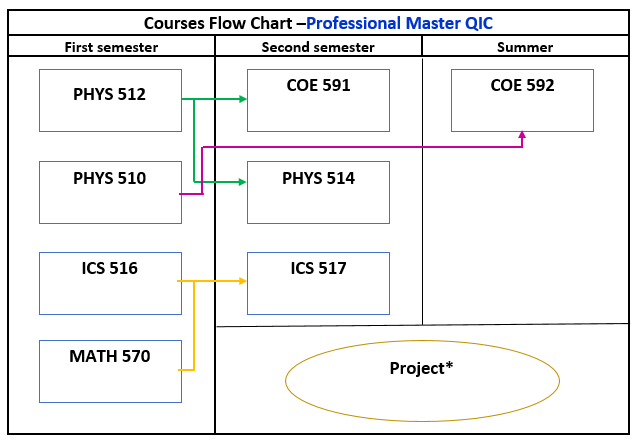Professional Master in Quantum Information and Computing
Admission Requirements
Students with four-year BS degrees in Physics, Computer Science, Computer Engineering, Electrical Engineering, or Math can apply for admission. Other students (without above-mentioned degree) can apply to the program if they have adequate knowledge of Quantum Mechanics, Programming, linear algebra, and electromagnetic wave theory.
In addition to above, the university general requirements are:
2.5 GPA,
IELTS 6.0 or TOEFL IBT 70 (NOT required from KFUPM graduates)
Two recommendation letters
Program Educational Objectives.
1. Prepare students to learn the technological developments in the field of Quantum Information and Computing
2. Prepare graduates for a successful career in related industry and R & D organizations
3. Provide graduates with broad knowledge that allows them to be self-learners
Program Learning Outcomes
On successful completion of this program, graduates will be able to:
Knowledge
K1. Recognize the basic quantum features that underlie QIC.
K2. Identify different types of qubits used in quantum computing hardware.
K3. Comprehend principles of quantum computing and information processing.
K4. Recognize the various applications of quantum computing in today’s technologies.
Skills
S1. Solve problems in quantum computing using linear algebra.
S2. Design, implement, and analyze quantum algorithms and applications.
S3. Evaluate the advantages and challenges of quantum cryptography.
S4. Manipulate simple data through quantum technology.
Competence
C1. Apply the knowledge and skills obtained in developing QIC-based technologies effectively.
C2. Cooperate in teams ethically and responsibly
Course Descriptions
PHYS 512 Introduction to Quantum Information and Computing (3-0-3)
Review of relevant Quantum Mechanics concepts including linear vector spaces, Entanglement, the EPR paradox, and Bell's inequality. Measurements in quantum system, functions and operators, density operators. Review of classical computing, quantum computation including the qubit, quantum gates and search algorithms. Quantum communication including cryptography and teleportation. Overview of some experimental implementations and idea of quantum hardware.
Pre-requisite: Graduate standing
PHYS 510: Fundamentals of Quantum Optics (3-0-3)
Review of relevant topics from quantum mechanics, Photon number states and Photon statistics, Coherent states of the radiation field, Resonant light-atom interactions, The Rabbi Model, the Janes-Cummings Model, Quantum Mechanics of Beam Splitters, Interferometry with a Single Photon, Interferometry with Coherent States of Light, Selected Applications to Quantum Computing and Information
Pre-requisite: Graduate standing
ICS 516: Quantum Algorithms (3-0-3)
Searching and sorting algorithms, Complexity analysis, Dynamic programming, Randomized algorithms, Review on Quantum Mechanics, Quantum solutions, Quantum Complexity theory and NP-Completeness, Grover searching algorithm, Fourier transform, Integer Factorization
Co-requisite PHYS 512
MATH 570: Math for Quantum Computing (3-0-3)
Vector Space, Eigenvalues, Linear transformation. Matrix representation and operations, Integer algorithms, Modular arithmetic, Linear Congruent, Chinese remainder theorem, Group theory, Finite fields, Quadratic residues, Probability Theory, Applications.
Pre-requisite: Graduate standing
COE 591: Quantum Computer and Architecture (3-0-3)
Review on Quantum Mechanics; Vector Space, Superposition. Classical bits, Quantum bits, and quantum states, Quantum circuits and micro-architecture, Programming quantum computers, Quantum protocols, Quantum machine learning, Applications: Deuscth and Jozha.
Pre-requisite: PHYS 512
ICS 517: Quantum Cryptography (3-0-3)
Review on Number Theory, Symmetric-key cryptography, Shannon Theory, Commitment scheme and coin-flipping, Public Key Encryption: RSA, Diffie-Hellman Protocol, ElGamal Cryptosystem, Quantum cryptanalysis, Quantum information processing, Quantum money, the quantum one-time pad, Key distribution protocols
Pre-requisite: ICS 516 and MATH XXX
PHYS 514: Quantum Hardware (3-0-3)
Basic concepts and operating principles of the quantum computer and quantum internet (e.g. the ket notation and the qubits), extensive discussion on some of the different ways qubits can be built. Photonic quantum computing, Superconducting qubits, NMR, Ion Trap quantum computing, Atomic quantum computing.
Pre-requisite: PHYS 512
COE 592: Quantum Communication (3-0-3)
Review of Quantum Physics, Entropy and information, Quantum noise, Quantum operations and entanglement, Distance measures for Quantum information, Quantum error-correction and fault-tolerance, Quantum Information Theory, Quantum Internet.
Pre-requisite: PHYS 510
PHYS 619: Project (0-0-6)
A graduate student will arrange with a faculty member to conduct an industrial research project related to the QIC, the field of the study. Subsequently the students shall acquire skills and gain experiences in developing and running actual industry-based project. This project culminates in the writing of a technical report, and an oral technical presentation in front of a board of professors and industry experts.
Pre-requisites: PHYS 512 and ICS 516
Courses Flow Chart
